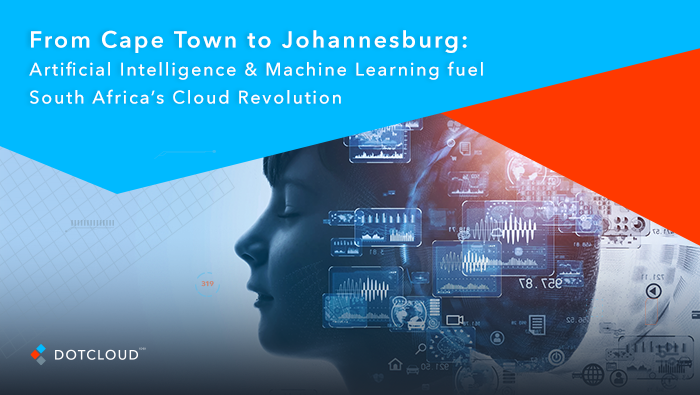From Cape Town to Johannesburg: Artificial Intelligence and Machine Learning Fuel South Africa’s Cloud Revolution.
Have robots taken over the world yet? Not really (we’re almost there), yet one trend we see developing at a rather fast pace is that of Artificial Intelligence (AI) and Machine Learning (ML). These two phenomena are transforming cloud-based organisations in South Africa, revolutionising the way businesses operate and making significant strides towards digital transformation. By integrating AI and ML technologies into their operations, businesses can automate processes, optimise performance, and improve decision-making.
Dotcloud, for example, is at the forefront of digital transformation. We leverage the cutting-edge technologies of AI to provide our clients with exceptional services that automate tasks, optimise performance, and drive better decision-making.
South Africa’s cloud computing market has witnessed remarkable growth, driven by factors such as increasing digitalization, the need for remote working solutions, and the rising demand for data storage and processing capabilities. With the cloud becoming the backbone of many businesses in the country, the integration of AI and ML technologies presents a unique opportunity to further enhance organisational efficiency and unlock new possibilities.
Benefits of Integrating AI and ML in Cloud Computing
The integration of AI and ML in cloud computing brings numerous benefits to organisations in South Africa.
- Firstly, these technologies enable businesses to analyse vast amounts of data in real-time, extracting valuable insights and patterns that can drive informed decision-making. By leveraging AI and ML algorithms, organisations can uncover hidden trends, predict customer behaviour, and optimise operations for improved outcomes.
- Secondly, the automation capabilities of AI and ML streamline business processes, reducing manual effort and human error. From automating customer support through chatbots to automating data analysis and reporting, AI and ML enable businesses to operate more efficiently and effectively. This not only saves time and resources but also enhances overall productivity.
- Furthermore, AI and ML integration in cloud computing enables organisations to improve customer experiences. By leveraging AI-powered chatbots and virtual assistants, businesses can provide personalised and instant customer support, improving satisfaction and loyalty. Additionally, AI and ML can be utilised to deliver personalised product recommendations, tailored marketing campaigns, and dynamic pricing strategies, enhancing the overall customer journey.
Use Cases of AI and ML Integration in Cloud Computing in South Africa
Across various industries in South Africa, AI and ML integration in cloud computing has shown promising use cases and transformative impacts. In the healthcare sector, AI-powered algorithms can analyse medical data to detect patterns and predict disease outbreaks, enabling proactive management and prevention measures. ML models can also assist in medical image analysis, providing accurate diagnosis and treatment recommendations.
In the financial sector, AI and ML can be used for fraud detection and prevention, analysing large volumes of transactional data to identify suspicious patterns and anomalies. This helps financial institutions mitigate risks and protect customer assets. Additionally, AI-powered chatbots can enhance customer service in banking, providing instant support and personalised recommendations.
Key Players in the AI and ML Integration Market in South Africa
The AI and ML integration market in South Africa is rapidly growing, with several key players leading the way. Local and international cloud service providers, such as Microsoft Azure, Amazon Web Services (AWS), and Google Cloud Platform (GCP), offer AI and ML capabilities as part of their cloud offerings. These platforms provide a range of pre-built AI models and tools that organisations can leverage to accelerate their AI and ML projects.
There are also South African companies specialising in AI and ML integration, providing tailored solutions to meet specific industry needs. These companies offer services such as AI consulting, custom ML model development, and AI-powered application development. By partnering with these specialised providers, organisations can access expertise and guidance in implementing AI and ML in their cloud-based operations.
Future Trends and Developments in AI and ML Integration in Cloud Computing in South Africa
The future of AI and ML integration in cloud computing in South Africa looks promising, with several trends and developments on the horizon. One key trend is the increasing adoption of edge computing in conjunction with the cloud. Edge computing brings AI and ML capabilities closer to the data source, allowing for real-time processing and analysis. This is particularly beneficial in scenarios where low-latency and high-bandwidth connections are not feasible.
Additionally, the convergence of AI and IoT (Internet of Things) is expected to play a significant role in the future. The combination of AI, ML, and IoT enables organisations to collect and analyse data from interconnected devices, leading to intelligent automation, predictive analytics, and improved operational efficiency.
AI and ML integration in cloud computing is transforming businesses in South Africa, enabling automation, optimization, and data-driven decision-making. The benefits of leveraging AI and ML in the cloud are evident across various industries, from healthcare and finance to manufacturing and beyond. While challenges exist, organisations can overcome them through strategic planning, data governance, and investment in skills development.
As South Africa’s cloud computing market continues to grow, the integration of AI and ML will play a pivotal role in driving digital transformation and shaping the future of business in the country. By embracing these technologies and staying ahead of the curve, organisations can unlock new possibilities, enhance productivity, and gain a competitive edge in the dynamic business landscape of South Africa.


Recent Comments